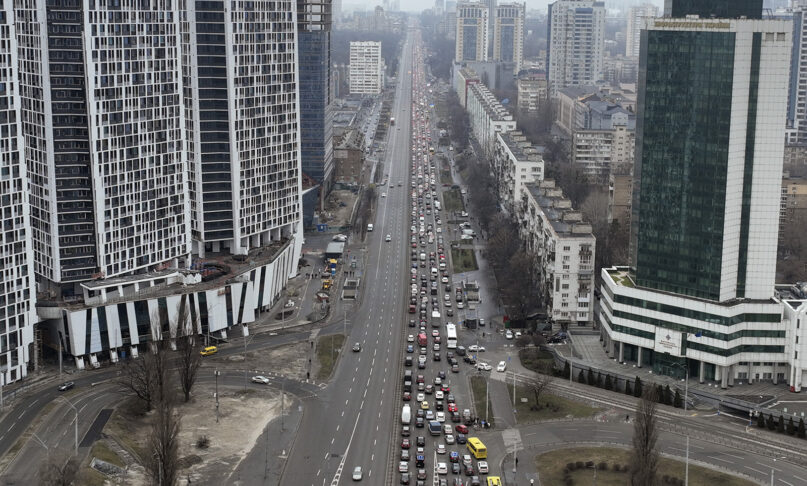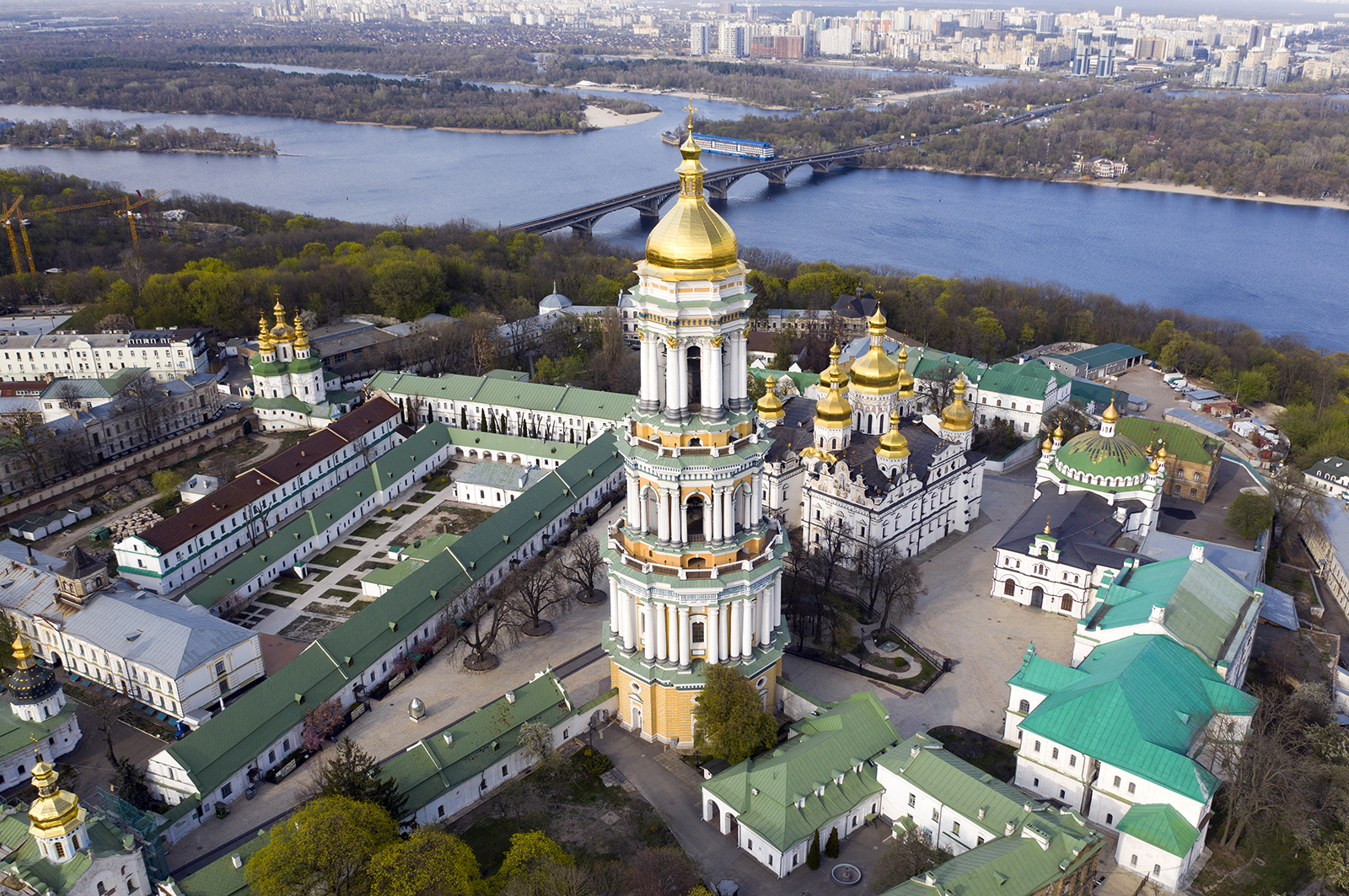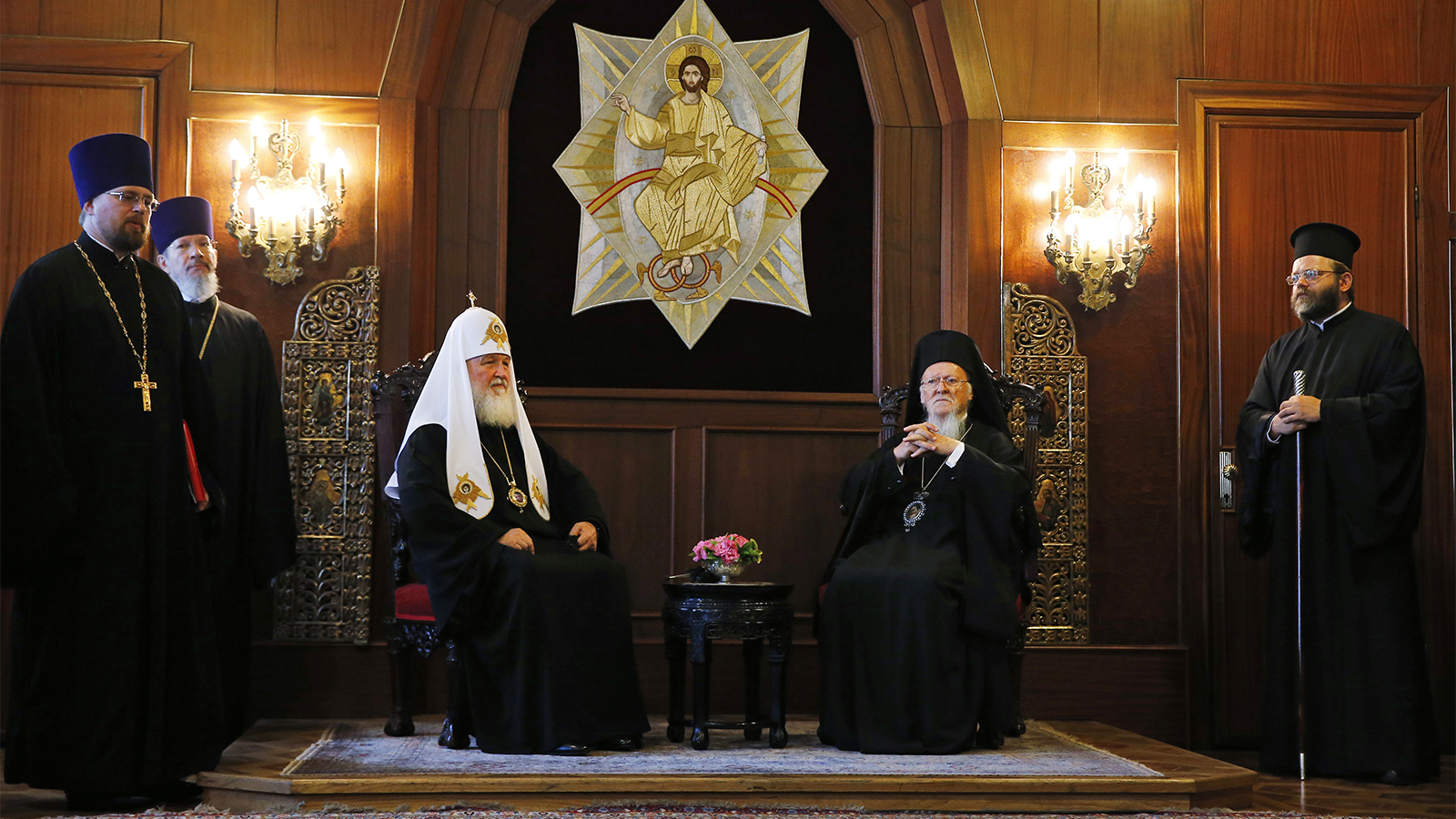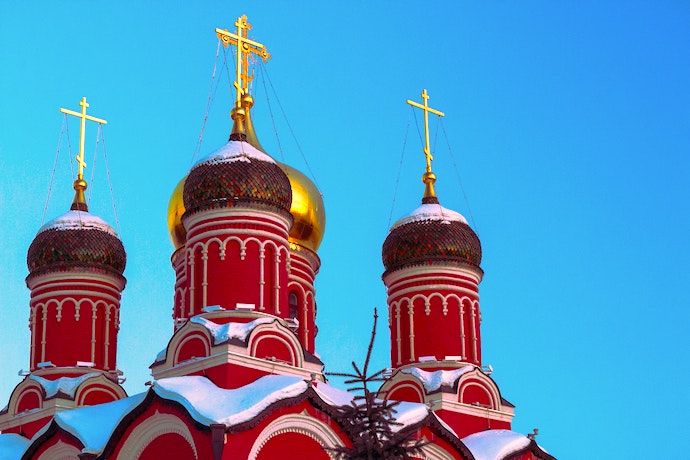This is an amazing insight. So many people are missing the religious orthodox beef taking place 
Putin’s Attack on Ukraine Is a Religious War
Putin’s Attack on Ukraine Is a Religious War
Russia’s aggression against its neighbor isn’t just power politics and geostrategy, it’s about core issues of faith and identity

It’s finally happened. Early today, after weeks of will-he-or-won’t-he speculation, Russian President Vladimir Putin declared war on his neighbor and launched a major, multi-pronged invasion into Southern, Eastern, and Northern Ukraine. This is just the first military phase of many to come, only a small amount of the vast forces that Moscow has marshalled on Ukraine’s frontiers have entered action yet. Any judgements about the progress of the war would be premature (though this newsletter will be providing regular assessments on this conflict, Europe’s most important war since 1945).
What needs to be established is why Putin has done this. Unleashing full-scale war here represents an enormous political gamble – failure in Ukraine could unravel his two-decade rule over Russia – from a leader who’s generally been tactically adventurous yet strategically cautious. Most Western “experts” got this wrong and many seem stunned that the Kremlin has really started a major war. As Top Secret Umbra previously noted, this represents a collective failure of the Western elite, which so misread Putin, despite his being plain about his contempt for the United States and NATO for 15 years, as well as his dismissive attitude towards Ukraine as more a “region” than a bona fide country:
Moscow told us, most of us just didn’t bother to listen. If Western elites listened at all, they dismissed Putin’s strange analysis as the ravings of a madman, or at least someone not operating in our Western unipolar reality. As this newsletter explained further:
To such elites, all of whom fall on the spectrum of Western Educated Industrialized Rich and Democratic, WEIRD for short, Putin represents an atavism whose motivations they cannot understand. The Kremlin strongman adheres to a distinctly throwback view of international relations where the use of force is normal, and countries protect their national interests unapologetically, with all the instruments of national power. Putin’s wholehearted embrace of religiously-infused nationalism, which boasts a venerable history in Russia, leaves WEIRDs befuddled yet has real resonance among average Russians. Western doubts that the former KGB man has “a personal relationship with Jesus Christ” miss the point, but then the West has never understood Russian Orthodoxy very well. No matter what Putin really believes, his public embrace of religiously-grounded national conservatism provides his regime with an ideological anchor, one which happens to view Ukraine’s subservience to Russia as a spiritual as well as geostrategic necessity.
The West hasn’t experienced a religious war in a long time, it’s been several centuries, but that’s exactly what Moscow has delivered. This idea is so foreign to WEIRD minds that it requires a bit of unpacking. Putin’s attack on his neighbor has plenty of secular aspects, above all the idea that NATO represents a major threat to Russia, thus Ukraine’s joining the Atlantic Alliance is flatly unacceptable to the Kremlin. While this is a significant factor in Moscow’s decision-making here, this issue is hardly new. Indeed, it’s been out there for years, as my analysis of Polish rearmament in autumn 2013 made plain:
Please note that I published that prior to Ukraine’s Maidan revolution (a “coup” in Kremlin parlance) and four months before Moscow stole Crimea from Ukraine. I didn’t realize all this because I was an intelligence officer for a long time, and I know lots of secrets. I figured it out because I know Eastern European history and I paid attention to what Putin and his top advisers actually said. That the Kremlin was obsessed with Ukraine and would resort to force to keep that country out of NATO was obvious by late 2013 to anyone bothering to pay attention. So, what’s changed? Why did Putin now decide to gamble everything and roll the dice with a massive act of aggression to bring Kyiv back under Moscow’s thumb? Indeed, since Russia’s 2014-15 war against Ukraine effectively keeps that country out of NATO indefinitely, because the Alliance will never admit countries that are in “pre-Article 5 status,” why the need for today’s bloody offensives?
Here's where religion matters. Religion is something WEIRDs seldom think about, and Russian Orthodoxy is impenetrable to them, yet understanding how religion plays into Putin’s geostrategic ambitions is vital for anyone seeking to comprehend the role of religious-civilizational thinking in Putinism. Over time, Russian Orthodoxy has assumed a central position in the Russian regime’s ideology and the Russian Orthodox Church, while not part of the state de jure, plays an important role in supporting Putin and vice versa. That Putin is a public believer legitimizes the ROC’s prominent role in the regime and its aims. None of this is new, I’ve been writing about it for years, and the only innovation here given Russian history is that Putinism has added a doctrine termed “spiritual security” which gives the ROC a mission in defending Russia from negative Western spiritual influences, in partnership with Moscow’s intelligence agencies. Calling this doctrine strange is an understatement, given that the KGB shattered the Orthodox Church under Bolshevism, murdering or imprisoning most of its clergy, but many aspects of Putinism are difficult for outsiders to comprehend.
Nevertheless, Russian Orthodoxy provides a sort of glue for the Putin regime, and the ROC supports the Kremlin on a wide range of issues. A prototypical figure representing this odd fusion of Putin-approved nationalism, Orthodoxy, and anti-WEIRDness is Aleksander Zaldostanov, known as “the Surgeon,” who heads the Night Wolves biker gang, which is Russia’s answer to the Hell’s Angels, if the Hell’s Angels spent a lot of time preaching about Orthodoxy, mystical Russian nationalism, and the evil of “f*ggots.” Zaldostanov, who is close to Putin, uses the Night Wolves to further Russian influence abroad, with help from the “special services,” and Zaldostanov has been active in Moscow’s aggression against Ukraine. “The Surgeon” denounced the Maidan revolution with the slogan “death to f*ggots” and suggested that Russia’s war in Ukraine is fundamentally about resisting America’s “Global F*ggot Empire.”
Senior Russian Orthodoxy clergy use more measured language, but they agree with Zaldostanov about the centrality of Ukraine in their religious-civilizational mission. Some of this is subsumed in the so-called “Russian World” project, which has ROC backing, and posits the essential unity of all Russians across the former Soviet Union. Although the ROC has officially stated it no longer espouses the historical “Third Rome” concept, there can be no doubt regarding the centrality of Ukraine in the Kremlin’s view of Orthodox destiny. As Patriarch Kirill of Moscow, the head of the ROC, explained in early 2019, “Ukraine is not on the periphery of our church. We call Kiev ‘the mother of all Russian cities.' For us Kiev is what Jerusalem is for many. Russian Orthodoxy began there, so under no circumstances can we abandon this historical and spiritual relationship. The whole unity of our Local Church is based on these spiritual ties.”
What spurred Patriarch Kirill to make that statement was the separation of much of the Ukrainian Orthodox Church from Russia in early 2019 with the creation of the Orthodox Church of Ukraine, with go-ahead from the Ecumenical Patriarch in Constantinople (i.e., Istanbul: who is the not-a-pope of world Orthodoxy, where national churches are self-governing). This involved the transfer of thousands of parishes and millions of believers from the long-existing Ukrainian Orthodox Church of the Moscow Patriarchate, which has been under the ROC since the seventeenth century, to the brand-new OCU. The UOC-MP is self-governing under Moscow and there wasn’t much spiritual demand in Ukraine for independence from Russia, what Orthodox term autocephaly.
However, the pressures of the not-quite-frozen conflict with Russia after 2015 made church issues a political football, and Ukraine’s then-President Petro Poroshenko made autocephaly his pet project, with backing from Ukrainian nationalists, who found it offensive that the UOC remained under Moscow, where the church is a vehicle for Putinism, Russian nationalism, and anti-Ukrainian aggression. Advocates of the new OCU had a valid point there, and they were also correct that, since autocephaly is the norm in the Orthodox world, why didn’t Ukraine have its own, fully independent national church?
The answer there, that Orthodoxy tends to move on “Orthodox time” which appears glacially slow to secular minds, thinking more in terms of centuries than years or even decades, was unedifying to advocates of the OCU, who got their wish in early January 2019, when the Ecumenical Patriarch granted autocephaly to Ukraine’s new national church. What followed was predictably messy and politicized, with fights across Ukraine over parishes and clergy. This issue is neither simple nor clear-cut: the OCU is considered broadly nationalist (with exceptions) while the UOC, despite its Russian connections, has many laypeople who are Ukrainian patriots who don’t feel they belong to a “foreign” church. Moreover, this issue birthed a schism in global Orthodoxy that has reverberated on several continents, most recently in Africa. The OCU-UOC split has even caused heartburn among American Orthodox believers.

Putin’s Attack on Ukraine Is a Religious War
Putin’s Attack on Ukraine Is a Religious War
Russia’s aggression against its neighbor isn’t just power politics and geostrategy, it’s about core issues of faith and identity

It’s finally happened. Early today, after weeks of will-he-or-won’t-he speculation, Russian President Vladimir Putin declared war on his neighbor and launched a major, multi-pronged invasion into Southern, Eastern, and Northern Ukraine. This is just the first military phase of many to come, only a small amount of the vast forces that Moscow has marshalled on Ukraine’s frontiers have entered action yet. Any judgements about the progress of the war would be premature (though this newsletter will be providing regular assessments on this conflict, Europe’s most important war since 1945).
What needs to be established is why Putin has done this. Unleashing full-scale war here represents an enormous political gamble – failure in Ukraine could unravel his two-decade rule over Russia – from a leader who’s generally been tactically adventurous yet strategically cautious. Most Western “experts” got this wrong and many seem stunned that the Kremlin has really started a major war. As Top Secret Umbra previously noted, this represents a collective failure of the Western elite, which so misread Putin, despite his being plain about his contempt for the United States and NATO for 15 years, as well as his dismissive attitude towards Ukraine as more a “region” than a bona fide country:
Putin waged a hot war of aggression against Ukraine in 2014-15, starting with Russia’s theft of Crimea by GRU’s Little Green Men, followed by the seizure of a good-sized chunk of Ukraine’s southeast by the Russian military. That conflict has ever entirely faded out, and Moscow’s de facto holding on to pieces of Ukraine means that country will never be allowed to enter NATO. Given the recent past, and the not-entirely-frozen conflict in Donetsk and Luhansk, how on earth can anybody be surprised that Putin might attack Ukraine again?
Moscow told us, most of us just didn’t bother to listen. If Western elites listened at all, they dismissed Putin’s strange analysis as the ravings of a madman, or at least someone not operating in our Western unipolar reality. As this newsletter explained further:
To such elites, all of whom fall on the spectrum of Western Educated Industrialized Rich and Democratic, WEIRD for short, Putin represents an atavism whose motivations they cannot understand. The Kremlin strongman adheres to a distinctly throwback view of international relations where the use of force is normal, and countries protect their national interests unapologetically, with all the instruments of national power. Putin’s wholehearted embrace of religiously-infused nationalism, which boasts a venerable history in Russia, leaves WEIRDs befuddled yet has real resonance among average Russians. Western doubts that the former KGB man has “a personal relationship with Jesus Christ” miss the point, but then the West has never understood Russian Orthodoxy very well. No matter what Putin really believes, his public embrace of religiously-grounded national conservatism provides his regime with an ideological anchor, one which happens to view Ukraine’s subservience to Russia as a spiritual as well as geostrategic necessity.
The West hasn’t experienced a religious war in a long time, it’s been several centuries, but that’s exactly what Moscow has delivered. This idea is so foreign to WEIRD minds that it requires a bit of unpacking. Putin’s attack on his neighbor has plenty of secular aspects, above all the idea that NATO represents a major threat to Russia, thus Ukraine’s joining the Atlantic Alliance is flatly unacceptable to the Kremlin. While this is a significant factor in Moscow’s decision-making here, this issue is hardly new. Indeed, it’s been out there for years, as my analysis of Polish rearmament in autumn 2013 made plain:
In addition to the Kremlin’s military buildup, recent Russian actions towards Ukraine, a buffer state that Poland considers vital to its security, have been ominous. As Ukraine’s government, led by the pro-Russian president Viktor Yanukovych, has seemed to favor closer economic ties to the European Union, at the expense of more engagement with Putin’s proposed Eurasian Union, the rhetoric from Moscow has heated up, culminating in an unambiguous threat to Ukraine’s territorial integrity. Last month, in language reminiscent of that used by Milosevic’s Serbia in the early 1990s, Sergei Glazyev, a top Kremlin adviser, noted that Russia has threatened to support a partitioning of Ukraine if it signs a landmark cooperation agreement with the European Union, adding that if certain regions of Ukraine where ethnic Russians live did not wish to join the EU, Moscow “would be legally entitled” to support them. It is abundantly clear that, for Putin’s Kremlin, anything less than a satellite in Kiev is unacceptable, a development that has major implications for NATO and the EU, as well as European security, not least because Ukraine is a pivotal state that is divided right along the fault lines cited by Samuel Huntington in his famous “Clash of Civilizations.” What happens to Ukraine in the near future will set the course for all of East-Central Europe in the decades ahead, and Poland knows this.
Please note that I published that prior to Ukraine’s Maidan revolution (a “coup” in Kremlin parlance) and four months before Moscow stole Crimea from Ukraine. I didn’t realize all this because I was an intelligence officer for a long time, and I know lots of secrets. I figured it out because I know Eastern European history and I paid attention to what Putin and his top advisers actually said. That the Kremlin was obsessed with Ukraine and would resort to force to keep that country out of NATO was obvious by late 2013 to anyone bothering to pay attention. So, what’s changed? Why did Putin now decide to gamble everything and roll the dice with a massive act of aggression to bring Kyiv back under Moscow’s thumb? Indeed, since Russia’s 2014-15 war against Ukraine effectively keeps that country out of NATO indefinitely, because the Alliance will never admit countries that are in “pre-Article 5 status,” why the need for today’s bloody offensives?
Here's where religion matters. Religion is something WEIRDs seldom think about, and Russian Orthodoxy is impenetrable to them, yet understanding how religion plays into Putin’s geostrategic ambitions is vital for anyone seeking to comprehend the role of religious-civilizational thinking in Putinism. Over time, Russian Orthodoxy has assumed a central position in the Russian regime’s ideology and the Russian Orthodox Church, while not part of the state de jure, plays an important role in supporting Putin and vice versa. That Putin is a public believer legitimizes the ROC’s prominent role in the regime and its aims. None of this is new, I’ve been writing about it for years, and the only innovation here given Russian history is that Putinism has added a doctrine termed “spiritual security” which gives the ROC a mission in defending Russia from negative Western spiritual influences, in partnership with Moscow’s intelligence agencies. Calling this doctrine strange is an understatement, given that the KGB shattered the Orthodox Church under Bolshevism, murdering or imprisoning most of its clergy, but many aspects of Putinism are difficult for outsiders to comprehend.
Nevertheless, Russian Orthodoxy provides a sort of glue for the Putin regime, and the ROC supports the Kremlin on a wide range of issues. A prototypical figure representing this odd fusion of Putin-approved nationalism, Orthodoxy, and anti-WEIRDness is Aleksander Zaldostanov, known as “the Surgeon,” who heads the Night Wolves biker gang, which is Russia’s answer to the Hell’s Angels, if the Hell’s Angels spent a lot of time preaching about Orthodoxy, mystical Russian nationalism, and the evil of “f*ggots.” Zaldostanov, who is close to Putin, uses the Night Wolves to further Russian influence abroad, with help from the “special services,” and Zaldostanov has been active in Moscow’s aggression against Ukraine. “The Surgeon” denounced the Maidan revolution with the slogan “death to f*ggots” and suggested that Russia’s war in Ukraine is fundamentally about resisting America’s “Global F*ggot Empire.”
Senior Russian Orthodoxy clergy use more measured language, but they agree with Zaldostanov about the centrality of Ukraine in their religious-civilizational mission. Some of this is subsumed in the so-called “Russian World” project, which has ROC backing, and posits the essential unity of all Russians across the former Soviet Union. Although the ROC has officially stated it no longer espouses the historical “Third Rome” concept, there can be no doubt regarding the centrality of Ukraine in the Kremlin’s view of Orthodox destiny. As Patriarch Kirill of Moscow, the head of the ROC, explained in early 2019, “Ukraine is not on the periphery of our church. We call Kiev ‘the mother of all Russian cities.' For us Kiev is what Jerusalem is for many. Russian Orthodoxy began there, so under no circumstances can we abandon this historical and spiritual relationship. The whole unity of our Local Church is based on these spiritual ties.”
What spurred Patriarch Kirill to make that statement was the separation of much of the Ukrainian Orthodox Church from Russia in early 2019 with the creation of the Orthodox Church of Ukraine, with go-ahead from the Ecumenical Patriarch in Constantinople (i.e., Istanbul: who is the not-a-pope of world Orthodoxy, where national churches are self-governing). This involved the transfer of thousands of parishes and millions of believers from the long-existing Ukrainian Orthodox Church of the Moscow Patriarchate, which has been under the ROC since the seventeenth century, to the brand-new OCU. The UOC-MP is self-governing under Moscow and there wasn’t much spiritual demand in Ukraine for independence from Russia, what Orthodox term autocephaly.
However, the pressures of the not-quite-frozen conflict with Russia after 2015 made church issues a political football, and Ukraine’s then-President Petro Poroshenko made autocephaly his pet project, with backing from Ukrainian nationalists, who found it offensive that the UOC remained under Moscow, where the church is a vehicle for Putinism, Russian nationalism, and anti-Ukrainian aggression. Advocates of the new OCU had a valid point there, and they were also correct that, since autocephaly is the norm in the Orthodox world, why didn’t Ukraine have its own, fully independent national church?
The answer there, that Orthodoxy tends to move on “Orthodox time” which appears glacially slow to secular minds, thinking more in terms of centuries than years or even decades, was unedifying to advocates of the OCU, who got their wish in early January 2019, when the Ecumenical Patriarch granted autocephaly to Ukraine’s new national church. What followed was predictably messy and politicized, with fights across Ukraine over parishes and clergy. This issue is neither simple nor clear-cut: the OCU is considered broadly nationalist (with exceptions) while the UOC, despite its Russian connections, has many laypeople who are Ukrainian patriots who don’t feel they belong to a “foreign” church. Moreover, this issue birthed a schism in global Orthodoxy that has reverberated on several continents, most recently in Africa. The OCU-UOC split has even caused heartburn among American Orthodox believers.







